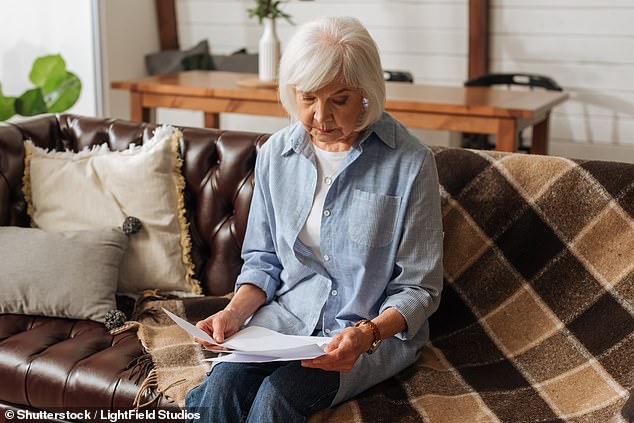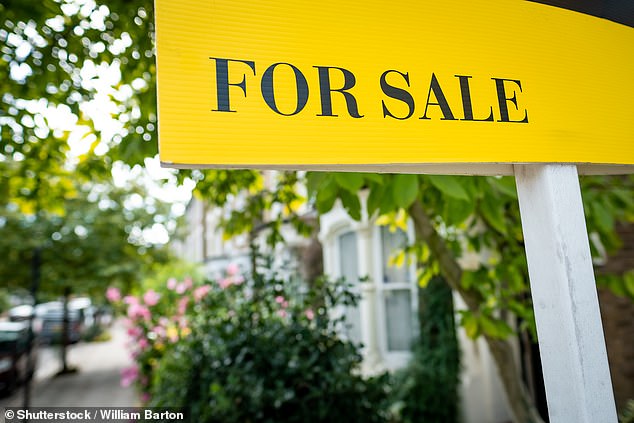Savers who don’t own their home could be hurtling towards a pensions crisis as the bill for renting in retirement reaches £400,000, This is Money can reveal.
Some 17 million people already aren’t saving enough money for the retirement they expect, according to fresh research from pensions firm Standard Life.
But as four million aspiring homeowners believe they will never own their own home due to soaring house prices and stagnant wages, Britain is speeding towards an even deeper retirement disaster which could upend the quality of life of millions of pensioners.
Retirees still renting in their golden years now need a staggering £398,000 extra in their pension pots to meet their housing costs compared to those who own their own homes, the Standard Life said.
This is based on projected rental prices over a 20-year retirement, which were calculated using Office for National Statistics rental data.

Feeling the pressure: Renting in retirement can stretch a pensioner’s budget (stock image)
The figures make grim reading for young and old alike who believe they will never get on the property ladder and will be at the whim of private landlords for the rest of their lives.
If a worker was to retire this year, they would need to pay £13,300 a year to rent a property on average. But by the twentieth year of retirement, the study forecasts rental costs will top £26,600.
But retire in five or ten years’ time, and the total cost will be higher still as rental prices continue to soar.
Someone who retired in 2024 would pay £391,000 in rent over the course of their retirement – some £7,000 less than this year’s £398,000, according to Standard Life.
The growing costs could lead to droves of pensioners not even meeting the basic standard of living in retirement, experts warn.
Single retirees need a £13,400 a year income for this, according to the Pension and Lifetime Savings Association.
It’s enough to spend £55 a week on groceries, a week-long holiday in the UK and up to £450 for clothing and shoes, among other expenses.
But this assumes you own your home and have paid off the mortgage. Add in rental costs and the amount needed will effectively double to £26,700, the Standard life calculations reveal.
Renters have half the chance of reaching the minimum retirement income level, according to modelling by pensions consultancy Hymans Robertson.
Pensioners have just a 43 per cent chance of meeting this basic living threshold if they rent compared to 98 per cent for those who don’t have any housing costs.
Steve Webb, former pensions minister, says: ‘A lot of retirement planning and tools assume that you just need to cover you basic living costs and as long as you can do that you will get by.
‘But if you have a very substantial lifelong commitment like renting then for most of us, the amount we’re saving is completely inadequate.’
Pensioners in London could pay £833,000 in rent
While earnings are higher in the capital, rental costs over the course of a retirement are double the national average as demand is high and supply is diminishing as landlords are pushed out of the market.
In the first year of their retirement, Londoners can expect to pay £13,300 in rental costs.
But over the course of their 20-year retirement this will total £833,000 once annual hikes to costs are taken into account. Calculations assume a yearly rent increase of 3.7 per cent.
For this price, you could buy a semi-detached home in the capital, says property portal Zoopla.
Those in the south east face the second most expensive costs for renting – but a significant drop compared to London. Pensioners can expect to pay £508,000 over the course of a 20-year retirement.
It’s the east of England next with costs to the tune of £454,0000 while in the south west it’s £534,000.
Scottish pensioners will have to set aside an extra £372,000 if they don’t own their own home.
Next is the northwest (£333,000), the East Midlands (£324,000), Northern Ireland (£311,000), and Yorkshire and the Humber (£303,000).
At the bottom end of the scale, it’s the north east where retirees will have the lowest rental costs in their later years – but pensioners will still need an extra £269,000 saved to stump up to their landlord.
Wales also has lower rental costs so retirees will an extra £294,000 in their pot.
Of course, the growth in rental costs will vary each year on factors like supply, inflation and the base rate so it’s impossible to predict the full rental costs.
These calculations, however, do give an estimate of the thousands of extra pounds retirees need to squirrel away in preparation.
Should I prioritise pension or property?
These sky-high costs make for an uncomfortable dilemma. Should savers continue paying into their pension to prepare for higher housing costs – or risk ditching pension contributions in favour of saving for a deposit, so they’re not left renting in later life?
Steve Webb, now a partner at pensions consultancy LCP, says anyone in a workplace pension should not opt out of their scheme.
‘If you have been enrolled into a workplace pension, in most cases you should stay in it. Opting out is very bad news.’
As an employer contributes at least 3 per cent of your salary if you contribute a minimum of 5 per cent, while the Government also provides tax relief, you’re essentially missing out on ‘free’ money if you choose to leave the scheme.

On the ladder – at last: Some argue savers should be allowed to access portions of their pension pots early in order to buy a home, and avoid renting in older age
But there’s no one right answer on whether pension contributions or saving for a house deposit should take precedence.
Claire Altman, a managing director at Standard Life, says: ‘As the lines between housing and retirement become increasingly intertwined, it’s clear that a holistic approach is needed.
‘For some, prioritising homeownership may be a key goal, while for others, focusing on building pension wealth will take precedence. The critical point is that both are long-term financial commitments which require careful planning.’
However, there is another more radical idea being floated which some claim could solve this retirement crisis.
There are increasing calls to allow savers to access portions of their pension pots early in order to get on the property ladder.
It sounds contradictory – taking money out of your retirement fund to improve the quality of your later life – but there is a growing understanding that retirement and housing are becoming intertwined issues.
It’s a scheme already in place in Australia, New Zealand and the US as well as Singapore.
While some critics say such a move would muddy the water, it’s an idea of which Webb is in favour.
He says: ‘Young people find it hard to raise the deposit, even with two people saving. If a bit of money from your pension could make the different between paying rent for the rest of your life and becoming a homeowner, then why wouldn’t we do that?’
Allowing buyers to access a quarter of their funds sounds like a sensible idea, he claims, as this wouldn’t encourage savers to be reckless.
But if this change to pension access does go ahead, he would like to see pension providers prompting savers to up their pension contributions a few years after taking out their deposit money.
Pensioners aren’t currently able to do this.
What can you do now to prepare for renting in later life?
If you’re fast approaching retirement, you can make some last-minute moves to bolster your savings.
First, look for any lost pension pots. Contact former employers to check on those which may be missing or use a free app like Gretel which will do the hard work for you. Some £31.1billion is currently sitting in unclaimed or inactive pension pots, which could make a significant dent in the housing crisis.
Delaying retirement is another option, as your state pension payments are uplifted by 2.5 per cent for each year you delay claiming.
Reconsider your pension investments, too, as default funds are likely to be conservative or low risk. If you are happy to take on more risk so close to retirement you could consider switching funds.
You could also think about inflation-linked annuities to pay your rent, which will provide some certainty on annual payments instead of panicking you will run out of money if your savings are left in a drawdown pot.
Young buyers who want to get their foot on the first rung of the property ladder can also take advantage of the Lifetime individual savings account (Lisa), where the Government will boost annual savings of up to £4,000 by 25 per cent.